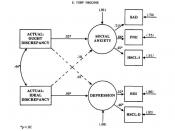Social Threat Situations: Specificity of Post Event Processing ABSTRACT The study used a measure of Post Event Processing (PEP) derived from Rachman et al. (2000), comparing levels of PEP across three hypothetical situations of social threat, physical threat and sadness. Differences in PEP between individuals high in social anxiety and low in social anxiety were also measured. The aim was to assess whether those with a high level of social anxiety engage in PEP to a greater extent than those low in social anxiety, whether socially anxious people engage in PEP specifically in response to social threat situations, and whether PEP is specific to social threat situations, and not those of physical threat or sadness. Results indicated that levels of PEP were greater for individuals with high social anxiety than for those with low social anxiety. It was also demonstrated that socially anxious people engage in PEP specifically in response to socially threatening situations.
There was no significant evidence to suggest that in social threat situations, PEP is associated only with high levels of social anxiety, however it is suggested that symptom similarity and overlap may make it difficult to distinguish between appropriate responses, and those which indicate an emotional disorder.
INTRODUCTION On the issue of social phobia, numerous theories have been put forth as to how the disorder occurs, and more pertinently, how it is maintained. The following study is based on a rationale put forth by the Clark and Wells (1995) Cognitive Model of Social Phobia. The model emphasizes four basic features in social phobic's which prevent the individual from disconfirming their negative beliefs about the danger of social situations, and hence maintain social anxiety. The first of these involves the individual focusing excessive attention on the self and ones own actions, creating the perception that others...


